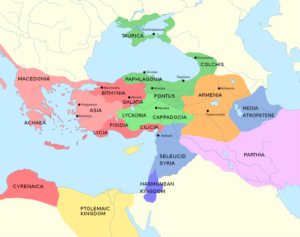“Blessed be the God and Father of our Lord Jesus Christ! According to his great mercy, he has caused us to be born again to a living hope through the resurrection of Jesus Christ from the dead” (1 Peter 1:3 ESV).
The phrase “born again” (as found here in 1 Peter 1:3) may be one of the most abused and misconstrued terms in all Christianity. Nevertheless, this concept was introduced by Jesus Himself, and the spiritual truths that underpin this idea are essential to a correct understanding of our relationship to God in Christ. For this reason, the reference to this phrase here in 1 Peter 1:3 is much too important to ignore or disregard.
We can begin our consideration of this subject with a look at an after-dark meeting between Jesus and a prominent religious leader…
“There was a man of the Pharisees named Nicodemus, a ruler of the Jews. This man came to Jesus by night…” (John 3:1-2a).
Nicodemus was a member of the Sanhedrin, or “ruling council,” the highest governing body among the Jewish people of that time. That council served as the final authority in all spiritual and administrative affairs, as long as the Roman government deemed their rulings acceptable. Since Nicodemus was a member of this governing body, we can identify him as someone who was religious, educated, and highly influential.
So why did Nicodemus choose to visit Jesus after dark? One possible answer is that Nicodemus arranged this night-time visit to minimize the potential for interruption. However, there is a second possibility that seems more likely given the prevailing attitude towards Jesus among the members of the religious establishment.
You see, Jesus was quite unpopular among the religious authorities of His era. At one point later in Jesus’ life, these religious leaders issued a directive that instructed anyone who knew of His whereabouts to report Him for arrest (see John 11:57). At other stages of Jesus’ ministry, these authorities also engaged in various acts of character assassination, attempted legal entrapments, and assassination plots.
In light of this, it seems far more probable that Nicodemus was afraid of what others might say if he was publicly seen with Jesus. So it seems likely that Nicodemus wanted to see Jesus, but also wanted to avoid being seen with Him. But to Nicodemus’ credit, it appears that he was the only one among his peers who was willing to interview Jesus in person and decide for himself. We’ll continue our look at Nicodemus’ encounter with Jesus next.


 The list of provinces given to us here in 1 Peter 1:1 may offer a clue regarding the first-century distribution of this letter. For instance, a courier who was tasked with the responsibility to deliver this epistle might begin in the northern region of Pontus and then proceed in a clockwise direction through the remaining provinces in the order given to us here. As the letter carrier traveled through these regional areas, each group of recipients had an opportunity to copy this letter for later reference before sending the messenger on his way to the next destination.
The list of provinces given to us here in 1 Peter 1:1 may offer a clue regarding the first-century distribution of this letter. For instance, a courier who was tasked with the responsibility to deliver this epistle might begin in the northern region of Pontus and then proceed in a clockwise direction through the remaining provinces in the order given to us here. As the letter carrier traveled through these regional areas, each group of recipients had an opportunity to copy this letter for later reference before sending the messenger on his way to the next destination.